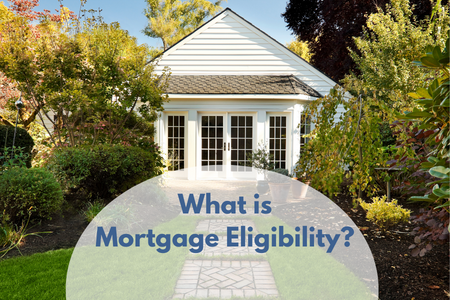Welcome To Our Mortgage Educational Blog About:
Understanding Mortgage Eligibilty

You must have heard stories about some first-time home buyers in Edmonton who were denied mortgage loans for some reason. They didn’t qualify for a mortgage loan because they are not eligible. Lenders pay attention to certain financial details before approving any loan, including mortgage loans, and these financial details determine your mortgage eligibility.
The size of the mortgage loan, your financial strength, and your history determine your mortgage eligibility. Your mortgage eligibility may differ among lenders, but it is profitable for you, as a first-time home buyer, to employ the help of an Edmonton mortgage broker.
After reading this piece, you’ll have a good understanding of mortgage eligibility. You’ll also know what determines your mortgage eligibility and how you can improve your eligibility for mortgage loans.
Mortgage Eligibility – A Brief Overview
When you’re ready to purchase a house, the first thought you have is to approach a lender for a mortgage loan. However, you won’t get approval for that loan without some considerations.
Your financial strength as per your annual income and credit score, compared to the size of the mortgage loan you want, determines your eligibility for that loan.
Therefore, mortgage eligibility is how well you qualify to get approval for a mortgage loan based on your financial strength and history, compared to the size of the mortgage loan you want.
Lenders want to be sure that you can repay your loan in a stipulated time, and at the agreed interest rate. And to do this, they take you, or your finances, through some calculations that help them determine your eligibility for the loan you’re seeking.
Usually, you’ll be in a better position to secure a mortgage loan if you employ the services of an Edmonton mortgage broker before approaching a lender.
Factors that influence your mortgage eligibility
Knowing what lenders look out for to determine if you qualify for a mortgage loan will help you prepare for applying for such loans.
Some of the factors that determine your mortgage eligibility include:
Size of down payment
A down payment is the percentage of your mortgage loan you’re able to pay upfront. A down payment is your initial financial effort towards purchasing your home. It shows your lender how prepared you are to own and finance a new home.
The more down payment you have for your home, the more confidence your lender has in approving your mortgage loan request. A down payment usually means you’ll need less money to borrow from your lender.
The higher the asking price of the home you’re seeking to buy, the higher your down payment should be. Usually, if the cost of purchasing a house is equal to, or above, one million dollars, you should have at least 20% of that price as a down payment. However, the lesser the price of your mortgage, the lesser the down payment you’re required to pay.
Credit history
Your credit history points to your financial stability and dependability. It is one of the factors that determine if a lender will grant your mortgage loan application.
Your history with paying off credit card debts as and when due, regularity of paying back previous loans such as car loans and mortgages, and your general debt profile will come under review to determine your mortgage eligibility.
If you’re found to be wanting in paying off debts as and when due, your mortgage eligibility is reduced. Therefore, first time home buyers should request a free copy of their credit report to ascertain if it’ll reduce their chances of getting a mortgage loan before applying.
GDS ratio
The Gross Debt Service (GDS) ratio is the comparison between your existing annual housing expenses and your annual income. It shows if you’ve existing housing expenditures, how much the annual housing expenses are, and if you’ll be able to pay your mortgage loan with your annual income.
Canada Mortgage and Housing Corporation regulations state that your GDS ratio shouldn’t exceed 39%. A lower GDS increases your mortgage eligibility. However, a good Edmonton mortgage broker can help you find lenders with flexible GDS requirements.
TDS ratio
Like the GDS ratio, the Total Debt Service (TDS) ratio is an important determinant of your eligibility for a mortgage. It describes the relationship between your annual income and your total annual debt, including housing expenses and credit card debt.
Lenders divide your total annual debt by your gross annual income to come up with your TDS. A TDS that’s higher than 44% exceeds the limit set by the Canada Mortgage and Housing Corporation. A TDS lower than the set limit increases your mortgage eligibility, although a good Edmonton mortgage broker can find lenders with less strict TDS limits.
Stress test
A stress test measures how well you can keep up with paying your mortgage in case of an increase in interest rates. It gives your lender confidence in your ability to continue to honor the interest rate payment agreement.
The qualifying rate for a stress test, according to the Bank of Canada is 5.25% of your mortgage or 2% of your mortgage added to your lender’s rate.
If you fail a stress test, you’re ineligible for a mortgage, although a good Edmonton mortgage broker can be of help.
How to improve your mortgage eligibility
Despite the many factors that determine your mortgage eligibility, you can improve your chances of getting a mortgage by doing these:
Improve your credit score
Pay off all your credit debt before you apply for a mortgage.
You can settle some credit card debts, pay your housing bills on time, and maintain consistency in payment to increase your credit score.
Save more
As first time home buyers, you should save towards buying a home. Set aside a comfortable percentage of your annual income for purchasing a home.
The amount you’re able to save serves as a down payment for your home, and the more you have, the higher your mortgage eligibility.
Get a co-applicant
Improve your mortgage eligibility by getting a co-applicant for a mortgage. The ideal co-applicant should have a good credit score and annual income.
On your own, you may struggle to meet all the requirements to increase your mortgage eligibility. However, with a co-applicant, preferably a trusted family or friend, your gross annual income increases, and that gives you a hood TDS and GDS.
Research lenders
Different lenders have different requirements. Make your findings about lenders and their requirements. Choose lenders that will look favorably on your limiting factors for mortgage eligibility.
You can also employ the services of a good Edmonton mortgage broker to help you find lenders that suit your situation.
Final Thoughts
Purchasing your home will most likely involve getting a mortgage, but your mortgage eligibility determines if you’ll get the loan. Understanding the factors that determine your mortgage eligibility and recruiting the help of a good Edmonton mortgage broker will increase your chances of owning a house as soon as possible.
Are you ready to purchase your first home? Reach out to me directly or start your application here: www.sandraforscutt.ca/mortgage-application/
Don’t hesitate to contact us with any questions you may have.
Recent Educational Blogs
First Responder Mortgage Program
Jan 2026 | First Responder Mortgage ProgramAt Metro Mortgage Group, we have deep respect for the everyday heroes of our city — the members of the Edmonton Police Service, EMS, and Fire Rescue Services. Your commitment keeps our community safe, often at great personal...
Pros and Cons of a Home Equity Line of Credit (HELOC)
Dec 2025 | Pros and Cons of a Home Equity Line of Credit (HELOC)If you’re a Canadian homeowner, you’ve probably heard friends or family talk about using a home equity line of credit, or HELOC. People often use it to renovate, consolidate debt, or help kids with school...
What the Latest Bank of Canada Rate Cut Means for Canadian Borrowers and Homeowners
Nov 2025 | What Rate Cut Means for Canadian Borrowers and Homeowners On October 29, 2025, the Bank of Canada made headlines by cutting its benchmark policy rate by 25 basis points. This move brought the policy rate down to 2.25%. For Canadians with mortgages, loans,...



